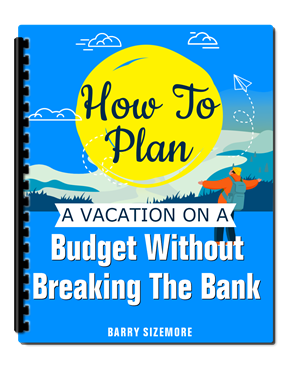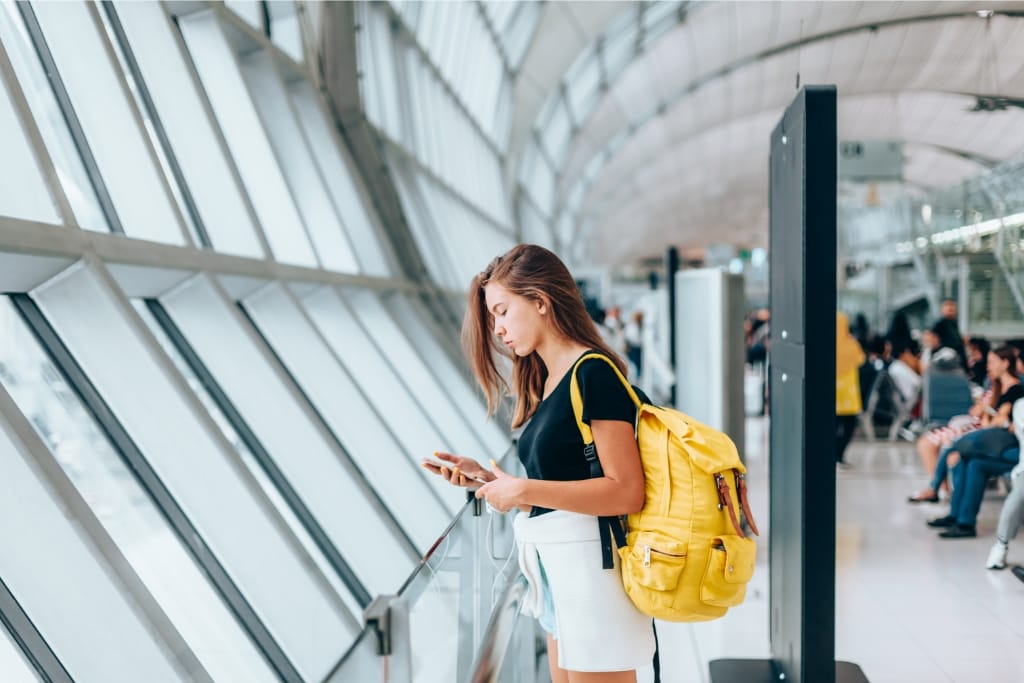Flying home from college for the first time can feel exhilarating, but for many college freshmen, it can also be nerve-wracking.
Airports are large, busy, and unfamiliar environments filled with complex rules, security checks, and strict timelines.
Combine that with your first solo flight experience, and it’s understandable if anxiety starts creeping in.
Airport anxiety is completely normal, and there are practical ways to manage it so your journey is smooth, calm, and even enjoyable.
We’ll share 10 proven ways college students can conquer airport anxiety on their first flight home.
From smart preparation to in-flight strategies, these tips will help you stay organized, take control, and travel with confidence.
1)) Plan and Organize Your Travel Schedule
Nothing fuels anxiety like uncertainty. Not knowing when to leave, where to check in, or how long security will take can make even a short flight feel overwhelming.
One of the best ways to reduce stress is to plan. Knowing your schedule in detail provides structure, reassurance, and a sense of control.
When planning your first flight home, give yourself plenty of time to navigate each step of the airport experience.
Avoid rushing or leaving tasks to the last minute, as this often increases anxiety.
By mapping out your day, you’ll feel more prepared, calm, and confident.
Tip Type: Pre-Flight Roadmap
- Create a checklist with flight times, terminal information, gate numbers, and estimated travel duration to the airport.
- Include buffer time for unexpected delays, like traffic, check-in lines, or security.
- Use apps like Google Maps or flight trackers to monitor airport arrival times and gate changes.
- Keep your boarding pass and ID easily accessible to avoid last-minute stress.
Example:
If your flight is at 3:00 PM, plan to arrive at the airport by 12:30 PM. Check in online the night before, pack your carry-on systematically, and set reminders for departure times to reduce any last-minute panic.
2)) Pack Smart to Reduce Stress
Packing can be surprisingly stressful, especially if it’s your first time traveling solo.
Anxiety often spikes when you worry about forgetting essentials, violating airline rules, or overpacking.
Smart packing not only ensures a smoother airport experience but also gives you peace of mind.
By organizing your items in advance and knowing exactly what you can bring, you minimize the chances of delays or last-minute surprises.
Proper packing can even make your security checks faster and less stressful.
Tip Type: Stress-Free Packing Blueprint
- Use a packing list to avoid forgetting essentials like ID, wallet, phone, chargers, and medications.
- Separate items into carry-on and checked luggage to comply with airline rules.
- Pack snacks, water, and a small comfort item to ease nerves during the flight.
- Place liquids in clear bags and follow the 3-1-1 TSA rule to prevent security headaches.
Checklist Example
Carry-On Essentials:
- ID / Passport
- Boarding Pass
- Phone + Charger
- Headphones
- Snacks / Water
- Lightweight jacket or sweater
Checked Luggage Essentials:
- Clothes for your stay
- Toiletries
- Shoes
- Any fragile or valuable items
Pro-Tip: Whenever possible, try to fit all your essentials into a carry-on and a backpack. Traveling light not only saves time at check-in but also reduces stress and eliminates the worry of lost luggage. If you don’t already have a reliable carry-on, consider investing in one—check out highly rated options on Amazon to make your first flight home smoother and hassle-free!
Click the button below to explore a selection of top-rated carry-on luggage on Amazon and travel stress-free on your first flight home!
3)) Familiarize Yourself With Airport Protocol
One of the main triggers of airport anxiety is unfamiliarity with the procedures.
Security checks, boarding gates, baggage drop-offs, and customs can all feel intimidating if you’ve never done them before.
By familiarizing yourself with airport protocols, you gain confidence and reduce unnecessary worry.
Knowledge is power. The more you know about what to expect, the more comfortable you’ll feel moving through the airport.
Understanding the steps in advance makes the experience predictable rather than chaotic.
Tip Type: Airport Navigation Guide
- Research your airport layout online; most major airports have interactive maps.
- Know where TSA checkpoints, boarding gates, restrooms, and lounges are located.
- Understand security procedures, like removing laptops, shoes, and liquids.
- Ask airport staff if you’re unsure about anything—they are trained to help nervous travelers.
Hack:
Many airports have YouTube walkthroughs or virtual tours. Watching a video of someone going through the airport can help reduce anxiety by showing you exactly what to expect.
4)) Practice Mindfulness and Relaxation Techniques
Anxiety often thrives when your mind races ahead to “what if” scenarios.
Practicing mindfulness and relaxation techniques helps anchor you in the present, keeping nervous thoughts in check.
Whether waiting in security lines or sitting on the plane, being mindful can dramatically reduce stress.
Simple techniques like deep breathing, visualization, or progressive muscle relaxation can help calm nerves instantly.
By training your body and mind to respond to stress in a controlled way, you’ll feel more confident navigating the airport.
Tip Type: Calm-Your-Mind Toolkit
- Deep Breathing: Inhale for 4 seconds, hold for 4 seconds, exhale for 6 seconds. Repeat several times.
- Visualization: Imagine yourself moving smoothly through the airport and boarding your plane with ease.
- Progressive Muscle Relaxation: Tense each muscle group for 5 seconds, then release to reduce physical tension.
- Mindfulness Apps: Use Headspace, Calm, or Insight Timer for guided exercises during travel.
Example:
If you feel panic rising while waiting at security, take out your phone, follow a 2-minute guided meditation, and focus on your breath until your heart rate slows.
5)) Understand the Boarding Process
Boarding is often the moment anxiety peaks for first-time flyers. Crowds, announcements, and long lines can feel overwhelming.
Knowing exactly how the process works makes it far less intimidating.
Airlines typically board passengers in groups or zones. Understanding your boarding group, gate instructions, and how early to line up ensures you’re not caught off guard.
Confidence in this process reduces stress and helps you stay in control.
Tip Type: Boarding Made Simple
- Arrive at your gate at least 30 minutes before boarding begins.
- Listen carefully to gate announcements; airlines often call passengers by group numbers or seat rows.
- Keep your boarding pass and ID ready to avoid last-minute scrambling.
- If anxious in crowds, stand slightly back and move forward gradually as your group is called.
Warning:
Trying to board too early can make you feel trapped in a crowded line, while arriving too late may cause unnecessary panic. Timing is key.
6)) Learn Tips For Air Travel Anxiety
Flying can be inherently stressful, but several strategies are specifically designed to manage air travel anxiety.
Learning and practicing these tips before your flight can make the journey far less intimidating.
From pre-flight preparation to in-flight relaxation, these methods focus on minimizing triggers and creating a sense of safety and comfort.
Using a combination of practical and psychological strategies ensures you’re fully equipped to handle your first solo flight home.
Tip Type: Anxiety-Busting Checklist
- Book a seat in a preferred area (window for scenery, aisle for easy access to restrooms).
- Bring distractions: books, music, podcasts, or games to keep your mind engaged.
- Inform flight attendants discreetly if you’re anxious; they are trained to help nervous passengers.
- Avoid excessive caffeine or alcohol, which can increase anxiety.
- Practice positive self-talk: remind yourself, “I am prepared and capable of handling this.”
Example:
Packing a small “comfort kit” with headphones, a travel pillow, and a stress ball can provide tactile relief and help you feel in control.
7)) Bring Entertainment and Comfort Items
Time can drag in airports, and a lack of distraction often intensifies anxiety.
Bringing entertainment and comfort items can make waiting and flying much more manageable.
Simple strategies like having your favorite music or a light snack can shift focus away from worry and toward something enjoyable.
Comfort items aren’t just for kids; they’re practical tools for stress relief. From soft scarves to travel blankets, these items help you feel more secure and cozy during the journey.
Tip Type: Travel Comfort Kit Ideas
- Noise-canceling headphones or earbuds for music, podcasts, or audiobooks.
- Light snacks and a water bottle to stay nourished and hydrated.
- Travel pillow, blanket, or scarf for comfort on long flights.
- A small journal or sketchbook to capture thoughts or pass the time creatively.
- Cozy socks or a sweatshirt to adjust to varying temperatures.
Example:
Listening to a familiar playlist during takeoff can calm nerves and make the experience feel more familiar, almost like being at home.
8)) Stay Informed But Avoid Over-Researching
Knowing what to expect is helpful, but obsessively reading about airport procedures, turbulence, or flight delays can increase anxiety.
College freshmen often fall into the trap of “over-preparing,” which creates more stress than comfort.
The key is to strike a balance: gather essential information without overwhelming yourself.
Choose reputable sources and limit exposure to potentially anxiety-inducing content.
Tip Type: Informed Yet Calm Strategy
- Review airline policies and airport instructions once, then step away from screens.
- Use official airline apps or websites to track flights, gates, and delays.
- Avoid excessive scrolling through forums or social media about flight fears.
- Focus on what you can control: packing, timing, and personal comfort.
Hack:
Set a timer: spend 30 minutes preparing and checking updates, then disconnect from travel content to preserve calm.
9)) Arrive Early and Give Yourself Time
Rushing is a major trigger for airport anxiety. Arriving early gives you time to handle unexpected delays, navigate check-in and security lines, and adjust to the airport environment without panic.
Giving yourself extra time allows you to stay calm, follow your plan, and feel in control.
Even if nothing goes wrong, the peace of mind from arriving early is invaluable.
Tip Type: Stress-Free Arrival Checklist
- Aim to arrive 2–3 hours before your flight for domestic trips.
- Identify key areas at the airport: restrooms, lounges, and departure gates.
- Allow time for food, bathroom breaks, and last-minute packing adjustments.
- Walk around, stretch, and breathe to release tension before boarding.
Example:
If your flight departs at 4 PM, arriving at 1:30 PM provides ample time for security, grabbing a snack, and mentally preparing for the journey.
10)) Embrace the Experience and Stay Positive
Finally, remember that your first flight home is a unique experience and an opportunity for growth.
Anxiety is natural, but it doesn’t define your journey. By embracing the adventure and focusing on positive aspects, you’ll transform fear into excitement.
Changing your mindset from dread to anticipation empowers you to enjoy the trip, appreciate the views, and build confidence for future travels.
Celebrate small wins, like navigating security smoothly or finding your gate without stress.
Tip Type: Mindset Shift Guide
- Keep a gratitude journal during travel to focus on the positives.
- Celebrate completing each step of the airport process successfully.
- Use affirmations: “I am capable. I am prepared. I can handle this journey.”
- Visualize the joyful moment of arriving home and seeing family or friends.
Idea:
Turn your journey into a mini adventure. Observe the airport’s architecture, explore shops, or journal about your travel experience to make it memorable rather than stressful.
Conclusion
Flying home from college for the first time doesn’t have to be a source of stress.
By planning, familiarizing yourself with airport protocols, packing smart, and practicing tips for air travel anxiety, college freshmen can confidently navigate their first flight home.
Every step you take to prepare, relax, and stay informed reduces anxiety and makes the journey smoother.
Airport anxiety is normal, and the more prepared you are, the more control you regain.
By using these strategies, your first flight home can become an empowering, even enjoyable experience.
Embrace the adventure, trust your preparation, and know that you’re fully capable of conquering airport anxiety.
Download Our Free E-book!







